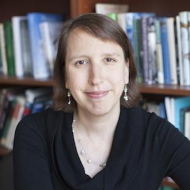In late March I traveled down to Nashville to attend one of my favorite conferences, NSTA—the National Science Teacher Association conference. If you haven’t been, this is an absolute must go for anyone interested in science education. Everyone is there, from textbook authors to science celebrities to teachers upon teachers upon teachers. Flamingos run through the exhibit halls (really!), teachers scream with delight as they spin in huge gyroscopes, and Schmitty the Weather Dog tap-dances his way into our hearts. It’s basically Circus Circus for science nerds and I love it.
There is so much going on that you’re lucky to make it to even half of the talks and workshops you plan, and you’re thankful for even making it to that many. I made it to about a third of my planned sessions—but as it happens, I went to just the right one, because I landed smack dab in the middle of a creationist debate.
It was at a talk being presented by one of my favorite science teachers from the south about her work and research on teaching evolution in a very evangelical community. She had a difficult start. While setting up, she dropped her computer, breaking it. As a result, she had to give her entire talk off the cuff. Yikes! I couldn't handle that with aplomb, but she pulled through like a trouper.
When the time came for discussion, almost immediately a creationist popped up with a question.
“Can you define evolution?”
What a strange question to ask! But she provided an answer and moved on.
Again the gentleman raised his hand. “How do you differentiate between micro- and macroevolution with your students?”
For biologists, of course, microevolution and macroevolution describe different perspectives on the history of life—microevolution focusing on patterns of evolutionary changes that occur within species, macroevolution focusing on patterns of evolutionary changes that occur over a larger scale. But for creationists, “microevolution” denotes the evolutionary changes that even they are willing to accept—often in terms of “Biblical kinds”—while “macroevolution” denotes everything else.
Recognizing the bait-and-switch in the offing, the teacher swiftly dealt with the question and moved on. But alas, it was too late. The floodgates (as it were) had been opened and a wave of questions followed:
“What do you think of the Next Generation Science Standards’ coverage of evolution?” (This is a trick question, because even some top-notch educators are not enthusiastic about the NGSS’s treatment of evolution.)
“What do you think of intelligent design?”
When the teacher responded that she doesn’t support teaching non-science in the science classroom, observing that “intelligent design” is not science, another creationist made her presence known. Suddenly the teacher was accused of being rude by dismissing the creationist perspective. Then, as other teachers in the room spoke in the defense of the teacher and in support of evolution, there were repeated cries from the creationists of “No! You are wrong!”
Yes, it happened, in 2016, at a conference of science teachers. Welcome to my world—and that of teachers across the country today.
Teachers tend to be nice, friendly, and approachable people who are not keen on conflict. Science teachers in particular are nice people who love science and want to broaden the tent, not make it smaller by offending people. So it wasn’t surprising that when the creationists were so disruptive, they weren’t actually shouted down.
It was gratifying, though, that so many of the teachers at the talk were willing to speak in defense of the teacher and in support of evolution. If we want more teachers like this, who are willing to stand up for science in the face of creationist attempts to disrupt science education, we need to let them to know that scientists, parents—everybody—are behind them. That we trust you to know the science and we rely on you to teach it to our children. At NCSE, we are trying to send that message. But my trip to Nashville was a startling reminder of how far we have to go.

